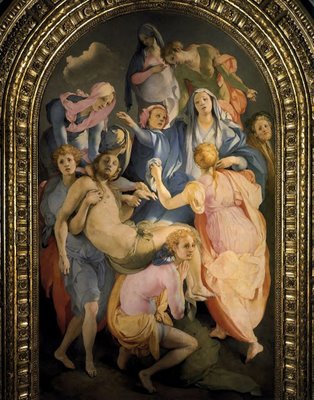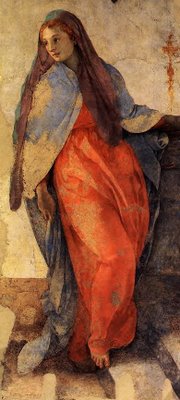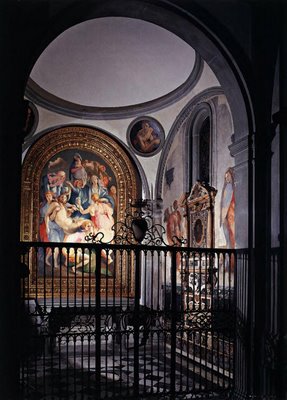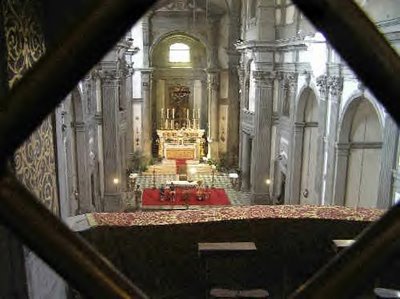 Pontormo: The Deposition c. 1528 Oil on wood, 313 x 192 cm Cappella Capponi, Santa Felicità, Florence
Pontormo: The Deposition c. 1528 Oil on wood, 313 x 192 cm Cappella Capponi, Santa Felicità, Florence  Pontormo: Detail of The Annunciation 1527-28 Fresco, 368 x 168 cm Cappella Capponi, Santa Felicità, Florence
Pontormo: Detail of The Annunciation 1527-28 Fresco, 368 x 168 cm Cappella Capponi, Santa Felicità, FlorenceThe Cappella Capponi in Santa Felicità in Florence
The chapel, was designed by Brunelleschi, and formerly patronized by the Barbadori family. It was bought by Ludovico Capponi in 1525, the year in which Pontormo started to work with the assistance of Bronzino.
The chapel, was designed by Brunelleschi, and formerly patronized by the Barbadori family. It was bought by Ludovico Capponi in 1525, the year in which Pontormo started to work with the assistance of Bronzino.
The chapel's altarpiece, the painting of the famous Deposition, can perhaps justly be described as the artist's masterpiece.
The figure of the Annunciation is frescoed on the wall of the window.
Four tondos with the Evangelists still adorn the pendentives that once supported the old cupola
According to Vasari, God the Father and Four Patriarchs, now lost, once decorated the hemispherical cupola, which was apparently replaced by a vault in the 18th century.
Santa Felicita
In 4th century a church was built on the site of Santa Felicita by the Christian community of Florence, opposite to the Roman city. This early-Christian building was subsequently modified and enlarged (in 11th century, and then in 14th century, when a tower located by the church was transformed in bell-tower), so that today only few fragments of the originary structure are still recognizable.
A feature of Santa Felicita is the Vasari Corridor (built in 1565). After the Medici transferred their residence to Palazzo Pitti, Cosimo I commissioned in 1565 Giorgio Vasari with the building of a corridor joining Palazzo Vecchio, the Uffizi and Palazzo Pitti. As a result of the Corridor, the church of was frequently rebuilt and eventually became the church for the Medici and after the Medici, the House of Lorraine. Members of the family took part in the religious services from the "coretto" or private chapel in Vasari's Corridor, set over the portico on the facade.
The granite column in the piazza was erected in 1381 and marks a Christian cemetery.
http://www.kfki.hu/~/arthp/html/p/pontormo/4capponi/index.html
http://www.kfki.hu/~/arthp/html/p/pontormo/4capponi/1deposi.html
http://www.firenze-oltrarno.net/english/arte/t-vasari.html
Regarding Pontormo's Drawings for the Destroyed Vault of the Capponi Chapel, see Janet Cox Burlington Magazine, Vol. 98, No. 634 (Jan., 1956), pp. 2+15+17-18 http://links.jstor.org/sici?sici=0007-6287%28195601%2998%3A634%3C2%3APDFTDV%3E2.0.CO%3B2-J&size=LARGE
Vasaris corridor: http://www.paradoxplace.com/Perspectives/Italian%20Images/Montages/Firenze/Vasari%20Corridor.htm




No comments:
Post a Comment